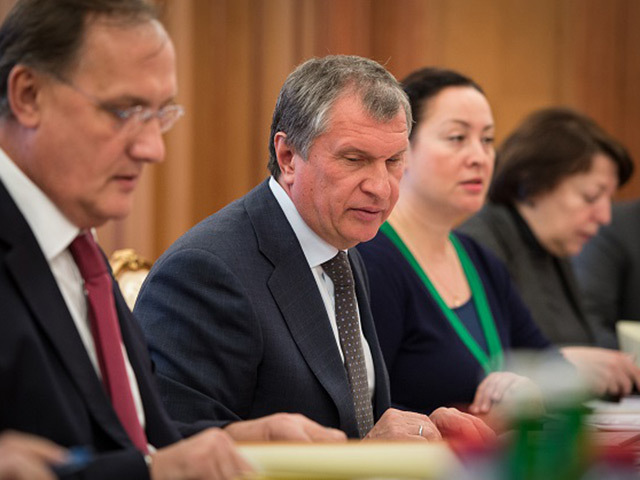
Igor Sechin, a long-time ally of Russian President Vladimir Putin, won an internal Kremlin struggle to buy the government’s share in a regional oil producer, allowing his company, Rosneft, to continue expanding.
Russia gave permission for Rosneft to buy the government’s 50.08 percent stake in Bashneft, according to an order published Thursday. The country’s largest oil producer, led by Chief Executive Officer Sechin, must pay no more than 330 billion rubles ($5.3 billion) and should sign the deal by Oct. 15, the directive shows.
The Bashneft sale, part of a government effort to shrink its budget deficit, will be Russia’s largest privatization since Rosneft’s $10.7 billion initial public offering in 2006. A fight over whether state-controlled Rosneft should be allowed to bid delayed the process, with some people in the Kremlin arguing that assets shouldn’t shift from one government pocket to another. Even though President Vladimir Putin acknowledged that such an acquisition was probably “not the best option,” Sechin ultimately prevailed.
“It was a victory because ultimately they were permitted to participate in the bidding for Bashneft, and seem to have won,” Emily Stromquist, an energy analyst at Eurasia Group Ltd. in London, said by e-mail.
Rosneft will get the Bashneft stake without opening the sale to other bidders, an official familiar with the sale said, asking not to be identified because the information was confidential. The actual deal value is planned at 329.6 billion rubles, the person said. Bashneft was valued last month at no more than 315 billion rubles.
The company’s board approved the deal on Saturday, according to another person with knowledge of the deal.
Sechin argued that the government would eventually get a higher price when it sells Rosneft shares later this year if his company was first allowed to buy the Bashneft stake, people familiar with the matter told Bloomberg in August. Putin left the door open for Rosneft, saying the company wasn’t strictly government-owned because BP Plc holds almost 20 percent of its stock.
BP spokesman Vladimir Buyanov declined to comment.
To read Bloomberg’s September interview with Putin, click here.
With Russia’s government facing its widest budget deficit in six years, it needs the money. Lukoil PJSC, the country’s second-largest oil producer and potentially a rival bidder for the Bashneft stake, said it wouldn’t buy the company at any price and called gains above the January valuation of about $4 billion “ speculative.” Lukoil’s press service declined to comment.
“We now have ultimate clarity that the government made a choice in favor of Rosneft,” Alexander Kornilov, an oil analyst at Aton LLC in Moscow, said by e-mail.
Rosneft itself is the next major state-held asset subject to a planned share offering, with the Economy Ministry committed to divesting a 19.5 percent interest by the end of the year. The value of the stake has been set at 700 billion rubles. The sale is likely to take place in November, RIA Novosti reported Thursday, citing Economy Minister Alexei Ulyukayev.
Rosneft itself is considering buying part of the state’s offering of its shares, spokesman Mikhail Leontyev said late Thursday. The company is confident that the share price will rise after the sale, he said. The government is discussing the possibility of such a purchase, Vedomosti newspaper reported on Oct. 5, citing a person familiar with the matter.
The potential for Rosneft to buy back its own shares could bring benefits to minority shareholders including a “better alignment of interests,” said Ildar Davletshin, an oil analyst at Renaissance Capital. The additional pressure on the balance sheet could increase the company’s focus on costs and free cash flow generation, he said.
Acquiring the stake in Bashneft will make little difference to the Rosneft sale, said James Henderson, an oil and gas industry analyst at the Oxford Institute for Energy Studies. As long as the assets are state-controlled, there will be concerns about inefficiency and increased bureaucracy.
“The acquisition could make Rosneft a little more attractive, I guess,” Henderson said by phone. “But you are still buying into the same story: Russia’s dominant state-controlled oil and gas company.”
At its current price, Bashneft should be able to add about 2 percent to Rosneft’s value, stemming from an estimated $2.6 billion in synergies, Aton’s Kornilov said. Rosneft has sufficient liquidity to avoid taking on more debt, he said.
Bashneft’s common shares, the class being sold by the state, fell 0.6 percent to 3,107 rubles at 3:54 p.m. in Moscow Friday after losing 2.7 percent Thursday. Its preferred shares dropped 6.3 percent to 1,565 rubles. Rosneft traded down 0.8 percent at 340.70 rubles.